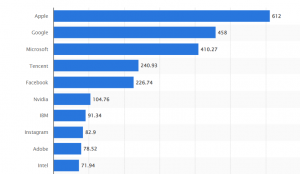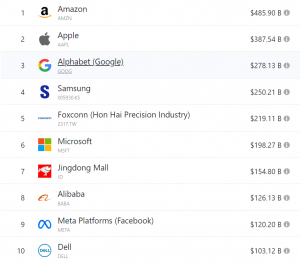
The world is struggling to regulate big tech companies. A slew of legislations under way in Europe, the US, and some Asian countries look to regulate big tech firms because of their impact on people’s privacy, survival of smaller companies, and the economy at large. The laws under consideration will be guided by dozens of ongoing anti-trust and privacy probes across the world.
The market clout and valuations of these companies is unparalleled in history. The market value of the top five tech firms — Google, Amazon, Meta, Apple, and Microsoft — is close to $10.31 trillion, and they grew fourfold in the last five years. Their annual revenues are higher than the GDP of most world nations which is the reason behind the urgency shown by national governments to bring in big tech regulation.
READ | India’s semiconductor industry dreams take wings with Vedanta-Foxconn venture
Revenue of top 10 tech firms

Value of top 10 tech firms

The biggest concern is that while people have little control over the various tech platforms they use, the companies hold unbridled power over the subscribers. The users cannot choose the messaging app they like and chat seamlessly across apps. All equipment come with pre-installed apps that cannot be deleted. Users have no access their data on platforms, and smaller tech companies face hurdles while competing with tech giants. Big tech could use personal info for monetary and other considerations without impunity.
While the companies agree that there is a need for big tech regulation, they continue to resist all attempts to control their operations.
Another worry is the impact of big tech on democracies world over. Platforms such as Facebook have not only outgrown their original remit, but have morphed into tools of spreading hate and swaying elections. It is not like whistle blowers have not done their part and the wrongdoings of such companies are not evident. Frances Haugen, a whistle blower, had recently alleged that Facebook and Instagram purportedly downplayed how their products were harming young people, stoking division, and weakening democracy. India also is affected by the global phenomenon of Big Tech firms misusing their reach to serve vested interests.
Big tech regulation in India
At the time when Frances Haugen revealed shocking details on Facebook’s operation, an employee at the Zuckerberg-founded company ran a test to see what kind of impact the social media channel had on a new user. The results were disturbing as the dummy account was barraged with polarising content, misinformation, violence, and gore. Hate speech, unverified rumours, anti-Pakistan rhetoric, Islamophobia content and viral content. A similar experiment with a test user was conducted in the US and produced almost identical results.
READ I Energy crisis may trigger European recession, social unrest
Even when users report certain groups, Facebook rarely takes action. The company claims that it has made significant investment towards controlling hate speech, but media reports say 87% of the company’s global budget for classifying misinformation was allocated to the United States and a meagre 13% for the rest of the world. India constitutes Facebook’s biggest market with over 340 million users, and nearly 400 million users on WhatsApp.
Twitter has its own share of skeletons in the closet. Recently, Twitter’s former head of security shared a series of shocking revelations about the platform’s dubious practices. This included hiring agents of the Indian government. According to the Washington Post, the Indian government compelled Twitter to put one of its agents on the payroll. The said agent was also provided with access to user data at a time of intense protests in the country.
Even after details of misdoings came in public domain, not much has been done towards big tech regulation. While the United States had advanced a flurry of legislative proposals, none of it led to anything concrete.
Consumers are growing wary of the power of big tech. Ever since the Facebook Papers revealed thousands of pages of leaked internal information which made it evident that Meta’s algorithm fostered anger to drive engagement and ignore privacy and safety of their users, the US has been pushing to regulate the space.
Need for stronger reforms
Despite growing apprehensions about social media platforms, consumers haven’t really altered the way they use them, say experts on social media and hate speech.
The problems in big tech regulation arise from the fact that most of them are based in the US, which has strongest free speech laws. Social media platforms host millions and millions of posts, messages, news reports, and videos that qualify as speech. Also, there is this question about who gets to decide what is right or wrong.
The need of the hour is antitrust proposals such as the American Innovation and Choice Online Act (AICO). When it becomes law, the bill will prevent dominant platforms such as Google, Amazon, and Meta from abusing their market power, and giving preference to their own services over those of the competitors.
Indian efforts towards regulation
Some experts say that big tech reform could become a double-edged sword. Social media has harmed society in many ways, but it has also been beneficial. While regulating can be a good thing, the same may turn into a nightmare depending on who’s in power and what those regulations ultimately try to achieve.
The Union government is looking at a legislation to regulate data collection and data usage policies of big tech companies. A panel has proposed to certain provisions in the Competition Act itself to address concerns surrounding the digital companies. The government will also take cues from global best practices to form a consensus. In India, search giant Google’s billing policy has been labelled as unfair and discriminatory by the CCI. The company is also facing an antitrust investigation against abuse of position.
Ecommerce platform Amazon has been subject to multiple raids by the CCI over alleged violation of competition laws. Previously, the Jeff Bezos-led company had been in the dock for allegedly favouring sellers that it had a stake in. Apple is also currently subject to a CCI probe on alleged unfair business practices pertaining to its app store policies.
